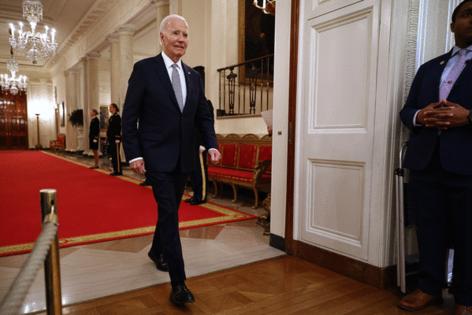Commentary: Biden's cancer diagnosis should be a teaching moment
Published in Political News
Former President Joe Biden’s metastatic cancer diagnosis brings together two controversial issues: PSA testing for prostate cancer and presidential politics.
To understand what is at stake Americans need basic information about PSA testing, and a frank discussion of the reasoning behind the prostate cancer screening decisions in the former president’s case. The dribble of information we’ve gotten only creates more uncomfortable questions for Biden and his family. The absence of adequate explanation also fails to contribute to public appreciation of these important medical issues.
The prostate, a walnut-shaped gland at the base of the bladder, produces “prostate specific antigen,” or PSA. Chemically classed as a glycoprotein, a sugar/protein aggregate, it leaks from the prostate into the blood, where its level can be measured with routine blood testing.
As men age, the prostate enlarges, increasing PSA levels. Screening tests take advantage of the fact that prostate cancer usually leaks more PSA than normal prostate tissue. And in the case of prostate cancer, the PSA typically rises relatively fast.
Beyond these basic facts, the PSA story becomes hazy. Although an elevated PSA may signal cancer, most men with an elevated PSA have benign prostate enlargement, not prostate cancer. Worse yet for screening, many men with prostate cancer have a mild and slow-moving disease that requires no treatment. They coexist with their disease rather than dying of it. This fact leads to the old adage that prostate cancer is the disease of long-lived popes and Supreme Court justices.
Medical advisory panels view PSA screening with skepticism partly due to the challenges of distinguishing benign PSA elevations from those related to cancer. Confirming a suspected cancer diagnosis requires prostate biopsies that can be painful and can produce side effects. Additionally, once a diagnosis is made, patients who might have coexisted with their disease may needlessly be subject to the harms of treatment, such as radiation and surgery. Finally, the benefits of early treatment of prostate cancer have been difficult to prove in clinical studies.
For all these reasons medical advisory panels have discouraged widespread testing or recommend a nuanced approach with careful discussion of risk and benefits between patients and their physicians.
Despite these concerns, the pendulum has swung toward more PSA testing in recent years. One reason is that improvements in radiographic imaging, such as MRI, allow for “active surveillance” that can track early lesions for signs of spread, allowing doctors to distinguish between relatively benign cases of prostate cancer and those likely to progress. Interventions can then be directed more specifically to those at high risk.
In my medical practice, I have generally been an advocate for prostate cancer screening despite the controversy surrounding the clinical benefits. My experience leads me to believe that early diagnosis improves prognosis. But even without improved medical outcomes, patients and their families still benefit from early diagnosis for the purposes of planning. No one wants to be sideswiped by a late-stage symptomatic disease that limits both clinical and life choices.
In Biden’s case, after some initial delay a spokesperson revealed on May 20 that there had been no PSA testing since 2014, during Biden’s vice presidency. The reasons were not revealed.
Such a decision might have been justified based on questions about the benefits and risks of PSA testing. However, given the importance of the health of a vice president and potential future president one might have expected doctors to err on the side of more information. The omission invites speculation that the political implications of a borderline or increasing PSA might have played a decisive role. More information regarding his last PSA and the basis for the decision not to continue screening might put such speculation to rest.
In the past, the public has gained insight into important medical conditions from the unfortunate maladies affecting the first families. Colon cancer screening received increased attention after President Reagan’s diagnosis in 1985. Betty Ford’s public disclosure of her struggles with alcoholism and prescription drug dependency helped de-stigmatize treatment for substance use disorders.
Biden’s illness also offers an opportunity. Consider that prostate cancer poses the greatest cancer mortality risk faced by non-smoking American men. Transparency in dealing with the former president’s condition would serve the public interest by increasing awareness and understanding of the important, nuanced care decisions faced by so many men.
____
Daniel J. Stone is an internist and geriatrician in Beverly Hills.
_____
©2025 Los Angeles Times. Visit at latimes.com. Distributed by Tribune Content Agency, LLC.

























































Comments